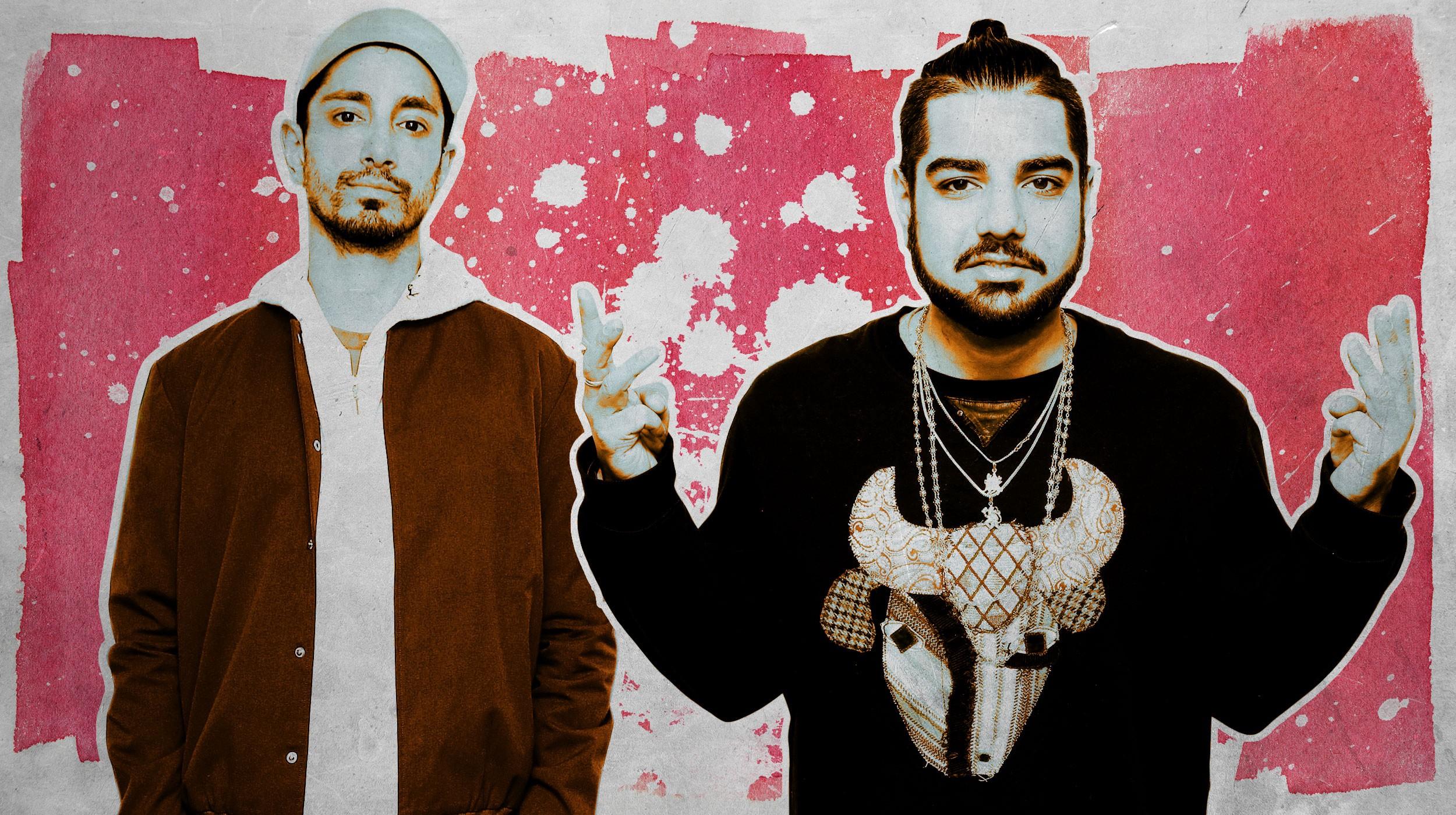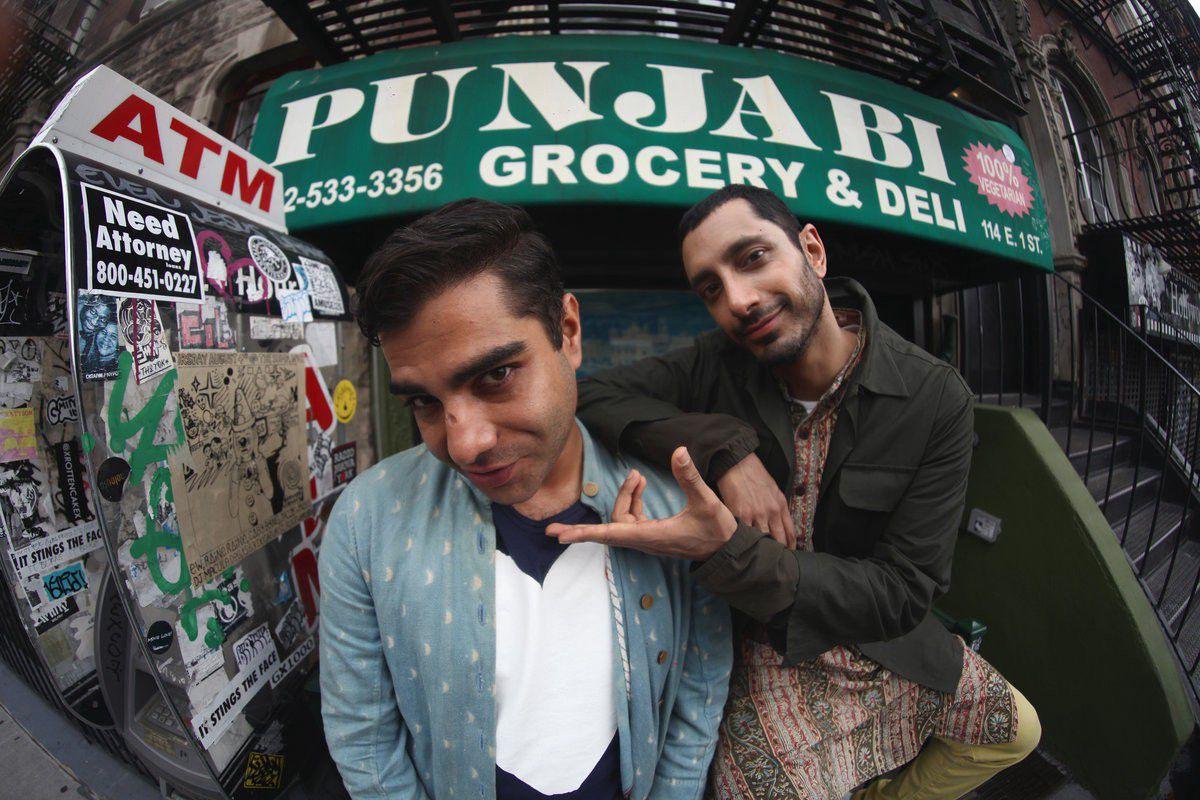
“You know the dudes who drive you home from filming?” Riz Ahmed, noted rapper/actor, is telling a not-particularly-relatable story in a very charming and engrossing and relatable way; he does this for a living. “They live out in Long Island or whatever. All are voting for Trump.”
It is Sunday night at a near-deserted East Village bar; 48 hours have passed since “grab them by the pussy” entered the public record, and the second U.S. presidential debate is two hours hence. The three members of hip-hop trio Swet Shop Boys — Ahmed, fellow rapper Himanshu “Heems” Suri, and Redinho, their one-named producer — are very concerned about getting home in time to wince through it. “I’m anxious about finding out what’s going on right this second,” Heems admits. They know in their hearts this election should be over; they know in their heads it is very much not.
“Yeah, I kind of try and ask people’s opinion,” Riz continues. “I try to be open-minded, but I just end up getting into, like, how is it the same? How are emails the same as” — he flicks his wrist, wordlessly reeling off various Trump scandals and atrocities — “duh duh duh duh duh. And you know, people are just going” — he slips into an everyman Mets-fan argot, with a little Saturday Night Fever thrown in — “‘Sometimes when you’re talkin’ with your friends, and you’re a guy, sometimes you say things like that. You say wild things about women. You know what it’s like. You’re a guy. It’s 11 years ago.’”
It’s a fine impression — another sympathetic character for Riz, best known as Naz from this summer’s HBO crime drama The Night Of — and another daunting cultural divide to reach across. “For everything, it’s like” — the blustery driver voice comes back — “‘You know, but the thing is, if you’re a smart businessperson sometimes, claiming bankruptcy, it’s good business.’ And it’s like, ultimately, no one really votes for rational reasons. People vote based on their emotions. That’s one thing I’ve learned.”

There is much to learn, both from people you relate to profoundly and those you can’t seem to relate to at all. The Swet Shop Boys are living proof. Riz, a Muslim born to Pakistani parents, hails from London; Heems, a Hindu born to Indian parents, was born and raised in Queens. You could build a half-dozen dense rap albums around those dichotomies alone. Both guys also dabble in acting, Riz far more prominently: In December, he will appear in a gritty, low-budget art-house flick titled Rogue One: A Star Wars Story.
The ripple effect is, uh, noticeable. When the group first convenes at a nearby coffee shop, Riz’s opening line is, “I went to see Richard Price today, man, he gave me a signed copy of Clockers.” Even with a low-slung ballcap on his head, he is soon approached by a young, blonde woman who tells him he was incredible in The Night Of and should’ve won the Emmy. But Heems, long prominent in the local visual-art and activism worlds, has his own sizable fan base, thanks primarily to Das Racist, quite possibly the funniest rap group of the past decade or so. You likely first met them via 2009’s goofy one-off viral sensation “Combination Pizza Hut and Taco Bell,” though subsequent mixtapes and one full-length album deconstructed racial and cultural matters with a profound, absurdist, mesmerizing élan. (See “All Tan Everything” or “Shorty Said.”)
You could build another half-dozen dense rap albums around those connections. “We have such really similar experiences in terms of where we’re from, culturally and classwise, and where we’ve ended up, culturally and classwise,” Riz says. “I’m really hard-pressed to find someone with as similar experiences and ideas and trajectories. But our temperaments and our personalities are really quite different. And that also reflects in the way we, like, sit on a beat. So it’s quite a good combination of similar palette, but very different styles.”
“There’s something to be said about having that shared bed of experiences,” Heems adds. “I remember hanging out with Riz like two months ago, and we were in the car speaking Urdu together. I can’t say I’ve been in a band before where I could just speak Urdu. Basically, just, like, my parents speak Urdu. I didn’t really speak it with any other people growing up. So it was cool.”

Swet Shop Boys first emerged in 2014 with a four-song, self-titled EP, quick and dirty and jovial and driven by the contrast between Heems’s jocular growls and Riz’s buoyant, high-pitched broadsides. Thesis: “We hot as Benny Lava.” The group, and the group’s name, were Riz’s idea; the two rappers bonded in part while he was researching his role in The Night Of, mining Heems for insight into the quintessential son-of-immigrants Queens experience. (Riz’s takeaway: There is no quintessential son-of-immigrants Queens experience, so just do your own thing.)
Musically, Riz had a freestyle/battle background and was best known in the U.K. for the playfully barbed 2006 single “Post 9/11 Blues”; after Das Racist’s 2012 breakup, Heems pivoted to a solo career that culminated with last year’s darker, sterner post-9/11 rumination Eat Pray Thug. Both rappers are well equipped to react to 2016’s particular cultural and political moment, from Trump to the Brexit, with both withering humor and wearied sadness. The first Swet Shop Boys full-length — Cashmere, out Friday — is a huge leap forward in its attempts to make sense of society’s huge leap backward. Track 1, the goofy airport-discrimination lament “T5,” kicks off with Heems rapping, “Inshallah / Mashallah / Hopefully no martial law.” In April, Southwest Airlines kicked a Muslim off a flight for saying “Inshallah” during a cellphone conversation. It means “God willing.”
Cashmere (note the pun) is practically an airport-discrimination concept album, from “T5” to “No Fly List” to “Shoes Off.” For this group’s white fans, shuffling through an airport-security line in their socks is the one place where they directly confront the war on terror; for others, the menace is just compounded there but painfully palpable everywhere else, too. “For me, it feels like [airport security] is the most overt manifestation of state-sponsored racism and structural prejudice, and the way that it’s been legitimized,” Riz says. “That’s what it is to me. And also the idea of being in no-man’s-land, being between places. It’s a strong metaphor for where sometimes we felt culturally.”
“It’s also nice to subvert the idea of, like, the jet-setting artist,” Heems adds. “Yeah, it’s cool, I travel a lot. But it’s like, yeah. That moment, it’s the most direct way to kind of explain. It’s a pretty straightforward representation of the discrimination that we go through.”
Even most of the album’s more frivolous topics have heavier cultural overtones: The rumbling, noir-ish “Zayn Malik” is Riz’s chance to marvel at the contradictions of a Muslim pop star, rapping, “Zayn Malik’s got more than 80 virgins on him / There’s more than one direction to get to paradise.” (Talking about the song now, Heems just grins and concedes that he loves One Direction, and pop music in general.)
The group’s secret weapon is Redinho, a British DJ and electronic-music polymath who handles all of Cashmere’s production and imbues both the samples and the live instrumentation (flute, talkbox, harmonium, etc.) with a sort of scholarly frivolity. This recent mix he did for Dazed magazine — dicing up Qawwali, psychedelic funk, Bollywood buoyancy, and “fuckloads of drums” — gives you an idea of his palette. Many of the album’s best moments arose from his ideas, from the way Riz and Heems trade lines on the grimy, paranoid “Phone Tap” (evoking the Firm’s surveillance-wary 1997 hit of the same name) or Riz’s deep, weary call-and-response with a haunting ney flute line on “Half Moghul Half Mowgli.”
The trio recorded Cashmere together, in London, over the course of a week; given all the aforementioned jet-setting, it was likely tempting to cut the whole thing over the internet, but the trio’s physical presence and camaraderie is very apparent and very much appreciated. Necessary, too — strength in numbers and all that. They wrapped it up just as June’s Brexit vote went down. “When Brexit happened,” Redinho says, “I remember the day of, sitting around with my friends, going, ‘What the fuck just happened?’ That’s why I worry about the Trump thing. People don’t realize that this shit could actually happen.”

Donald Trump and his Muslim ban come up only once on Cashmere, which prefers to keep its politics personal, and cuts the seriousness with goofier moments like “Tiger Hologram,” a fine point of entry for Das Racist obsessives, given its singular mixture of lasciviousness and deadpan absurdity. (There’s something existentially profound about the way Heems delivers lines like, “I’m the best dude / Eat the best food / I was gonna text you.”) But there’s not a whole lot else on anyone’s minds at the moment; the trio’s scheduled live gig in L.A. on Election Night will be particularly fraught. “We’re gonna have, like, results screens,” Riz says. “I’d just come from L.A., and everybody’s like, ‘I’m looking for something to do that night. I’m so fucking anxious I can’t stay home.’” Heems puts it succinctly: “We’re either gonna be celebrating or really upset.”
The personal-is-political core of Cashmere boils down to a Heems line, noting that to most of America, his culture is both an unknowable threat and a commodifiable novelty: “Used to call me ‘Curry’ / Now they cook it in the kitchen.” For the group’s white fans, Das Racist thrived in that wildly discomfiting DMZ between what the group could teach you and what you’ll never know. “There’s a little bit of a divide, but the idea is you make the art to bridge that divide,” Heems says now. “And if you can get some level of empathy into the conversation, that’s one of the main reasons to do this. A lot of that idea, the visibility of like — ‘Oh, that dude’s kinda like me.’ It’s super-stylized, rap, but you try to boil it down to this feeling that everyone can relate to. You don’t have to be an immigrant or part of a diaspora to feel like an outsider.”
Riz cheerfully sums up Cashmere as “a celebration of our confusion.” Such are the trials and celebrations of rappers-turned-actors and outsiders-turned-insiders; some things have gotten far better, some things far worse. Election Night will either be a cautious new beginning or a death knell. But Cashmere wears its heaviness lightly and its confusion confidently. Growing up, Riz and Heems both turned to rap music — via Tupac and Hot 97, respectively — that reflected their feelings, but not necessarily their faces. “I hope that, the kids listening to this, they’ve got us,” Riz says now. “Not that we might be the best role models in the world or whatever, but, like, it’s something. Even if it’s something to look at and then say, ‘I hate that,’ and then define yourself against it. There’s a blueprint you can burn, or follow.”

